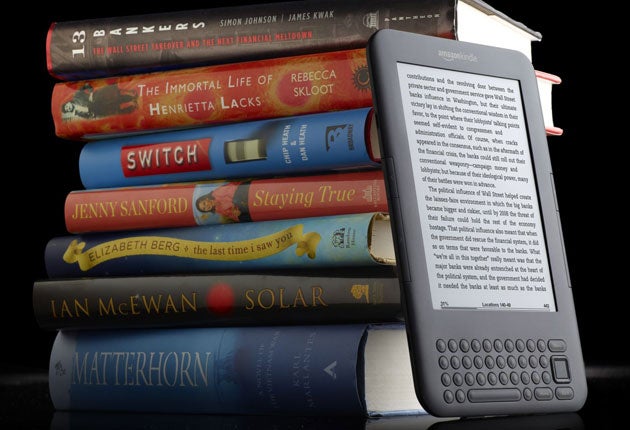Rhodri Marsden: Kindling an affection for electronic readers
Cyberclinic

Your support helps us to tell the story
From reproductive rights to climate change to Big Tech, The Independent is on the ground when the story is developing. Whether it's investigating the financials of Elon Musk's pro-Trump PAC or producing our latest documentary, 'The A Word', which shines a light on the American women fighting for reproductive rights, we know how important it is to parse out the facts from the messaging.
At such a critical moment in US history, we need reporters on the ground. Your donation allows us to keep sending journalists to speak to both sides of the story.
The Independent is trusted by Americans across the entire political spectrum. And unlike many other quality news outlets, we choose not to lock Americans out of our reporting and analysis with paywalls. We believe quality journalism should be available to everyone, paid for by those who can afford it.
Your support makes all the difference.It's talked about in the US as the "iPod of the book world", as deeply associated with reading as horses are with riding. And yet in Britain we've not been able to experience Amazon's Kindle without paying through the nose for shipping and customs charges from the States, and then buying ebooks in US dollars. So while the American reviews of what they call the Kindle 3 focus on comparisons with the Kindle 2 and the original, for us it's our first proper look. It's like being shown Return Of The Jedi without having any prior Star Wars knowledge.
Fortunately it's better than Return Of The Jedi, at which point I'll stop attempting to compare an e-reading gadget with a science-fiction film. Its e-ink display is a thing of great beauty; it isn't backlit, so it just looks like a printed sheet of paper covered by a thin plastic sheet. In a good way. One blogger this week subjected the screens of various devices and print formats to microscopic examination, and the similarity between the Kindle and a newspaper was extraordinary. The upshot of all this is that it's easy on the eye, and easy on the battery – one month between recharges if you keep wi-fi switched off. Sure, you'll have trouble seeing the screen in the dark, but your copies of Catch 22 or Delia Smith's Book Of Cakes aren't backlit either, so stop complaining and switch a light on.
Once you have a book opened up, the Kindle does its job beautifully. You flip backward and forward through the pages speedily, add bookmarks, read unencumbered by electronic distractions, and can store around 3,500 books. The only downside is the limited functionality when doing stuff other than reading – like, for example, buying a book. We've become so used to stabbing small screens with our fingers to make things happen, and on many occasions I wanted to swipe or tap the Kindle's screen, but instead had to laboriously manoeuvre a cursor around with fiddly keys, rather like playing a primitive maze-based game on a ZX81. This makes using some of the Kindle's features rather tiresome compared to, say, the iPad – but then again, for a little more than £100, who's complaining?
The Kindle's low price will be a key factor in our attitude towards it. The iPad is unquestionably a beautiful object, but it's pricy. Pricy enough and chi-chi enough for you to think twice about getting it out on public transport, lest you be thought of as a swaggering hipster or compulsive show-off. The Kindle isn't flashy; it's sober, demure, the colour of a civil servant's suit. But the act of solitary reading isn't one that you generally want interrupted by curious gazes or, worse, people saying: "Ooh, what have you got there?" (This is why one doesn't go for an afternoon in the park with a book and a boa constrictor.) Whether, as one American professor claimed this week, e-reading will make "buying literature cool again" is open to debate; Amazon's offering of popular blogs on the Kindle for £1.99 per month when they're already free to read on the web isn't so much "cool" as "confusing". But there's no doubt that its arrival in the UK will prove to be an e-reading tipping point.
***
The news that a Hollywood plastic surgeon died in a car crash last week shortly after sending SMS messages has ignited more furious debate online on the subject of texting while driving. Tech website Gizmodo has no fewer than 11 posts and 2,000 comments on this topic in the last 18 months, with arguments raging between those who admit to doing it while calling for companies to focus urgently on finding a solution to their terrible predicament, and those who rightly say that this compulsion to communicate in a timely fashion isn't just unhealthy, it's downright dangerous.
A year ago today, Gwent police uploaded a video to YouTube which should ensure all viewers never do it again – bit.ly/texting-driving. But while we wait for voice-to-text technology to bring SMS addicts a foolproof solution, an app called Otter – available now for Android, and due imminently on other platforms – neatly senses when you're driving (ie, moving faster than 15mph or so) and auto-replies to any texts, informing the sender that you're currently guiding several tons of metal at high speed down a stretch of tarmac. Please install it, or something similar. Or – and here's an idea – turn your phone off for a bit.
Join our commenting forum
Join thought-provoking conversations, follow other Independent readers and see their replies
Comments